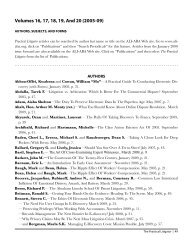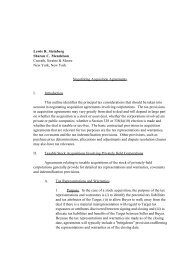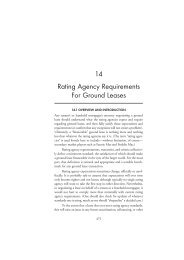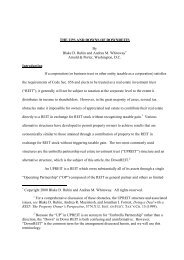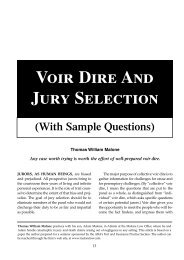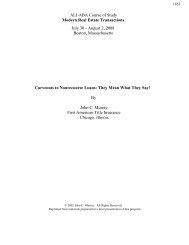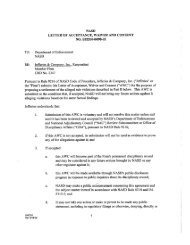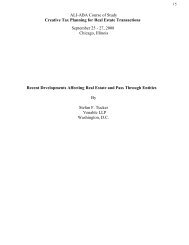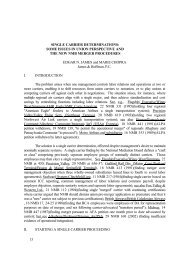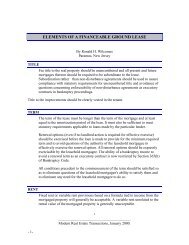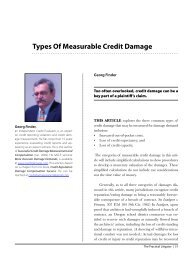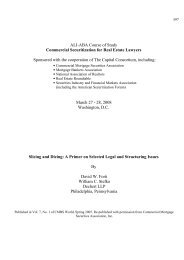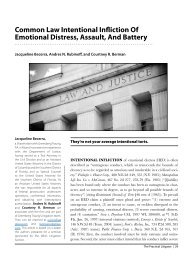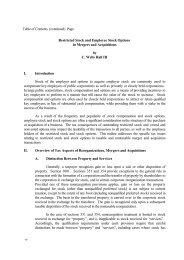ALI-ABA Course of Study International Trust and Estate Planning ...
ALI-ABA Course of Study International Trust and Estate Planning ...
ALI-ABA Course of Study International Trust and Estate Planning ...
Create successful ePaper yourself
Turn your PDF publications into a flip-book with our unique Google optimized e-Paper software.
28<br />
will not be treated as a shareholder <strong>of</strong> a PFIC if he becomes a shareholder after December 31,<br />
1997. 141 If a foreign corporation is classified as a PFIC, then certain larger than normal<br />
distributions from the foreign corporation (so-called "excess distributions") <strong>and</strong> all gain realized<br />
upon a sale or other disposition <strong>of</strong> the stock <strong>of</strong> the foreign corporation will trigger taxation under<br />
the PFIC regime. 142 When an excess distribution is made or gain is realized on the sale or<br />
disposition <strong>of</strong> the stock <strong>of</strong> the foreign corporation, the excess portion <strong>of</strong> the distribution or the<br />
gain is allocated over the period that the U.S. citizen or resident alien held the stock <strong>of</strong> the<br />
foreign corporation. 143 The portion allocated to the current year <strong>and</strong> to years prior to the time<br />
that the foreign corporation was classified as a PFIC is included by the U.S. citizen or resident<br />
alien in his gross income as ordinary income. 144 The portion allocated to years (other than the<br />
current year) when the foreign corporation was classified as a PFIC is subject to tax at the<br />
highest rate in effect for the year to which the allocation was made, <strong>and</strong> this tax is subject to an<br />
interest charge that generally denies the shareholder any benefit that may have been derived from<br />
the deferral <strong>of</strong> taxation. 145<br />
The punitive nature <strong>of</strong> the PFIC tax regime arises from (i) its applicability to any<br />
U.S. citizen or resident alien shareholder <strong>of</strong> the foreign corporation (no matter how little stock he<br />
owns, either directly or indirectly, in the foreign corporation), (ii) the taxation <strong>of</strong> capital gains at<br />
the higher ordinary income rates, <strong>and</strong> (iii) the imposition <strong>of</strong> an interest charge on the deferred<br />
taxes.<br />
A U.S. citizen or resident alien shareholder <strong>of</strong> a PFIC has two alternatives to<br />
taxation under the general PFIC tax regime described above.<br />
First, the U.S. citizen or resident alien may elect to treat the foreign corporation as<br />
a "qualified electing fund" ("QEF"), provided that the foreign corporation annually furnishes the<br />
shareholder with certain prescribed information. 146 A U.S. citizen or resident alien who makes a<br />
QEF election is required to include annually in his income his pro rata share <strong>of</strong> the foreign<br />
corporation's earnings <strong>and</strong> pr<strong>of</strong>its. 147 This inclusion is characterized as ordinary income to the<br />
extent that it is attributable to the ordinary earnings <strong>of</strong> the foreign corporation, <strong>and</strong> as long-term<br />
capital gain to the extent that it is attributable to the net capital gain <strong>of</strong> the foreign corporation. 148<br />
Since the losses <strong>of</strong> a foreign corporation will not pass through to the U.S. citizen or resident alien<br />
shareholder under the QEF regime, a shareholder who makes a QEF election may be subject to<br />
tax, over time, on amounts that do not actually represent net earnings <strong>of</strong> the foreign corporation.<br />
Second, the U.S. citizen or resident alien may make a mark-to-market election<br />
with respect to the stock <strong>of</strong> the foreign corporation, provided that the stock <strong>of</strong> the foreign<br />
141<br />
142<br />
143<br />
144<br />
145<br />
146<br />
147<br />
148<br />
§1297(e).<br />
§1291(a)(1) <strong>and</strong> (2).<br />
§1291(a)(1)(A).<br />
§129l(a)(l)(B).<br />
§1291(a)(1)(C); §1291(c).<br />
§1295.<br />
§1293(a)(1).<br />
Id.<br />
{00187507-1} 24



